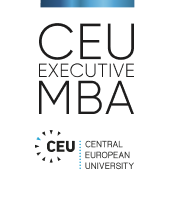
The EMBA for
The open world®
Course Descriptions
During your CEU Executive MBA, you will participate in sixteen executive core courses and nine electives that you will select from as many as fifty options. All courses were designed with mid-career executives in mind and cover a wide array of practical tools and perspectives. Below, you can find course descriptions of our core classes.

Global Economy in 2030 [Module C4]
What are the key trends in the global economy in the next decade? This course is unique in bringing together both traditional macro-economic ideas and placing them in the multidisciplinary institutional context. Apart from macroeconomics, sessions draw on a variety of disciplines including political economy, economics of migration and inequality, technology and critical sociology. The goal is to develop a nuanced understanding of macro-economic, socio-economic and political-economic environments in which business operates. Participants will not only learn theoretical concepts but also apply them to analyzing fundamental challenges facing today’s global economy. They will also be encouraged to think critically about prevailing economic models.
Economical Thinking [Module C4]
Economics is a way of thinking about the world. Over decades, economists have formulated and further elaborated a set of applicable models that are useful for understanding business and management challenges, ranging from decisions that take place every day to more expansive strategic decisions made by leaders of companies and organizations facing highly volatile and complex contexts. The objective of this course is to help EMBA participants understand economic models and appreciate where and how they can be practically applied in their decision-making, resource allocation and strategic thinking.
Managerial education has traditionally been dominated by inductive thinking, most famously represented by the case method. But the business world is changing.
In numerous areas of business, the importance of deductive skills (and even ‘deductive instincts’) is increasingly acknowledged.
To develop those skills, a group of professors from CEU’s Department of Economics and Business will confront the participants with eight highly influential economic models that have changed our understanding of the market and its associated institutions. Each model will be introduced over a 100-minute session, with a concluding discussion for participants.
Control 1-2 [Module C1]
Financial reporting plays a key role in organizational transparency and has a major impact on the effective functioning of the economy. How companies manage these areas is critical, especially given the cases of fraud, abuses and reporting irregularities. Accounting constitutes the language of business and is the basis for economic decision-making. It is widely perceived to be regulated and meant to follow the rules. We will discuss the implications for corporate behavior and the continuum of mechanistic application of rules to interpreting them at will.
Recent years have seen trends toward globalization and standardization. They have sparked vibrant debates on best practices and on the practicalities of using global accounting standards. We will revisit those debates and implications for the comparability of financial information.
Business Strategy 1-2 [Modules C1 & C8]
Strategic skills are a key asset for business leaders across business functions and seniority levels. The need for and benefit of those skills is no longer limited to elite staff groups or top executives. Increasingly, companies expect their product managers, senior business analysts and mid-level executives in diverse functions to possess the ability to think and act strategically without losing their agility. Therefore, this course will focus on the craft, the opportunities and the challenges of developing strategies in these roles. As we do so, the most basic strategic question is:
How do we best position and compete among significant uncertainty and ambiguity to maximize value created and profits made in a sustainable way?
This course provides students with a combination of analytical and engagement tools for strategy projects for internal or external executive clients. Among the analytical skills are methodologies and frameworks for product, firm, industry and market analysis. Among the softer engagement skills are diagnostic skills.
Nonmarket Strategy 1-2 [Module: C4]
Competitive advantage is achieved and maintained not only through market means, such as by reliance on product innovation, brand management, supply chain and operational excellence, unique performance-oriented learning culture or synergy-creating M&As.
All over the world, businesses try to leverage nonmarket environments to establish or maintain an edge over competitors.
Companies lobby for favorable regulations, protectionist trade policies or direct subsidies. Once regulations are in place, businesses put significant effort into developing compliance policies and/or long-term relations with governmental agencies that wield significant discretion in how to apply the law.
The nonmarket environment is not only about the government. A host of nongovernmental actors, both old (the media, labor unions, traditional associations, churches) and new (local and global advocacy groups, social media ”hashtag” campaigns, billionaires’ mega-foundations) influence governmental policies that are essential to business competitiveness or try to directly influence corporate behavior.
This course will engage participants in a case-based discussion about research-based tools of ethical but active nonmarket strategy. You will see that law, policy and politics are topics not only for a cocktail party conversation; they can become a part of your core managerial toolkit – just like marketing, accounting, or finance.
Finance 1 [Module C2]
The primary objective of this first course in finance is to provide executive fellows with a broad-based understanding of the principles and techniques of Corporate Finance and apply them to the main decisions faced by the investors and corporate executives. Participants will learn the basic building blocks of finance – time value of money, the basics of debt and equity financing, project appraisal techniques, risk and return trade-offs – which will help them analyze and evaluate more complex issues covered in subsequent finance courses.
Data 1: Statistics for Executives [Module C2]
The aim of statistics is to extract key insights from vast amounts of numerical data. You will learn how data comes about and how this process affects the quality of information embedded in it. As an executive, a solid foundation in statistics helps you appreciate the uncertainty around measurement and around forecasting. A vocabulary of key statistical concepts and definitions gives you the confidence to get more involved with data-related people and processes in your organization. Hands-on exercises will illustrate the benefits of a rational, quantitative approach to business problems.
Finance 2A [Module C3]
This course aims to provide a broad understanding of the principles and techniques of finance, and applications of those principles to solve problems faced by investors and financial managers. The course covers the basics of portfolio theory, how firms fund investments and manage risk, and some methods to evaluate the value of companies and investment projects.
The course culminates in a team project in which students must analyze a firm’s financial decisions and compute the “fair value’’ of the firm.
Our learning objectives are achieved through the discussion of both theory and real-world applications.
Finance 2S [Module C3]
The aims of the course are to provide a broad understanding of the principles and techniques of finance, and applications of those principles to solve problems faced by investors and financial managers in corporations. Building on the foundations in Finance I, this course examines the three key pillars of corporate finance: Financing, Investing, and Dividend Policy. Participants will learn of some of the ways firms raise capital externally, how they formulate their capital structure and determine their overall cost of financing. In the investing decision, we will analyze and evaluate the viability of value-creating projects. Finally, when companies generate profits, we will determine whether to return the money to shareholders via dividends and share buybacks or reinvest into the business.

Data 2A: Engineering and Analytics [Module C4]
Data engineering is increasingly important to leverage the value created by data scientists and analysts.
Executives who understand the basics of data engineering can help their team create data products that are easy to change in response to ever changing business requirements.
This course offers a high-level overview of the types of decisions data engineers have to make, and a hands-on illustration of the most common problems in real-world data. The key goal of this course is to help executives make decisions about the data analytics efforts of their business and ask the right questions of their teams.
Data 2S: Analytics and its Management [Module: C4]
What does it take for executives to successfully supervise and use data analytical projects? What can data and analytics do for your business?
We discuss key concepts in machine learning and how they can be applied.
We use real-life case studies specially designed to illustrate what we can learn from the analysis but also discuss limitations.
Digital Transformation [Module C8]
The COVID-19 pandemic has vastly accelerated and amplified fundamental transformation that has been progressing for the past few decades. The root cause of this transformation is not the virus, but technological development itself.
Technology now ranks as the number one factor impacting organizations by its revolutionizing of products, operations, and business models.
In this technology-driven business environment, competition may come from anywhere. Digitization of the products & services, sales and even a broader customer experience will soon not be enough; we need to digitally reinvent our entire enterprise in order to succeed in this disruptive environment. We need to fundamentally reimagine how our organizations operate and how they engage with their stakeholders. Living in ecosystems is inevitable as digitalization reshapes not only enterprises but industries, countries, and global economies. Orchestrated ecosystems will help organizations access new markets, develop new engagement models, and expand their existing capabilities. New customer experience is at the core of digital reinvention and because of that forward-thinking organizations are developing experience-based strategies by bringing the customer back to the center of their universe.
The goal of this course is to examine the current digitalization “state of play” to better understand the near future and be prepared for the second wave. Our scope is not to explore the emerging technologies but to understand the interplay between technology and management since this is the only way to be successful in digital transformation.
Marketing & Consumer Behavior [Module C6]
Most MBA marketing courses treat marketing as an entity—something which “is.” Indeed, they primarily aim to address the question “What is marketing?” This course, on the contrary, begins with the notion that marketing is ultimately a practice—something which is done. Consequently, in addition to establishing the conceptual foundations of marketing, it will also explore how to do marketing.
For many people, marketing is viewed as a tactical activity. Indeed, if you ask a random person on the street the question ‘What is marketing?’, the most common response is that marketing means advertising.
This course elevates marketing from the tactical to the strategic, thereby rendering marketing the primary economic engine of a company.
Marketing is often called the boundary-spanner of a company because it links the company to consumers in the market. Understanding consumers, therefore, is central to effective and efficient marketing. In recent years, new developments in such fields as behavioral economics, neuromarketing, and data analytics have provided marketers with additional tools to help understand consumers. Consequently, this course introduces some of these new developments.
Operations Management & Global Supply Chain [Module C7]
Operations Management addresses the supply of goods and services in a global economy. The fundamental focus is on understanding the best way to match supply and demand at any organization. We describe marketing as the management of demand and operations as the management of supply. Operations managers need to carefully manage and direct resources such as capital, labor, technology, sustainability and information. This is done in multinational environments with increasing pressure for ‘more, better, faster,’ ’greener’. Customer service, quality and use of appropriate technology are critical factors. Rapid and effective communications, including the internet, produce more options and choices than ever for the consumer.
The objective of this course is to provide decision makers with an understanding of how operations management drives competitive advantage.
The course covers tactical models, analytical skills and decisions to manage manufacturing, supply chain and service operations from the perspective of general managers and management consultants.
Innovation & Entrepreneurship [Module C8]
The objective of this course is to expand your strategic repertoire as an entrepreneur or innovator acting as an individual, within teams or established organizations. Drawing on a range of case studies, original research, video material, selected literature, and guest speakers we will explore the characteristics of entrepreneurship and innovation processes, their consequences, and their sensitivity to internal (e.g. leadership and management) and external (e.g. policies and levels of development) factors.
You will develop practical insights on how to get innovation off the ground.
We will, in particular, discuss how to shape innovation trajectories, how to embed innovations within new or existing organizations effectively, and how behavior influences the success of entrepreneurship. Participants will finish the course with an overview of entrepreneurship across sectors and geographies and the impact state policies have on bringing to market innovative products and services in a range of industrial and social contexts.
Electives [Modules C1, C5 & C9]
CEU Executive MBA offers an unprecedented choice of electives.
Each summer, you will be able to choose from over 25 courses in strategy, leadership, innovation & entrepreneurship, marketing, finance, operations management, economics, business & society.
Each summer of your program a different selection of courses will be offered, giving you a breadth of choice unrivalled by any executive program in Europe. And if you want to take an elective after you graduate, you can come back to CEU and benefit from our Alumni Course Offering program.
In Participants' Words
“All the classes are just mind-blowing. This is the perfect course to meet amazing people, learn from great lecturers and gain the maximum knowledge in the shortest time that I have as an entrepreneur.”
NATALIA OSZKO-JAKAB
Class of 2022
Liszt Institute
Brussels, Belgium
